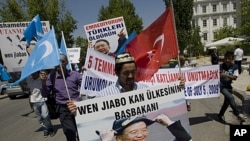The Chinese government is dismissing reports claiming human rights abuses continue in China’s far-west mainly Muslim province, Xinjiang, two years after deadly race riots claimed scores of lives.
A new report from Amnesty International says Chinese authorities continue to silence members of the indigenous Uighur community following the July 2009 unrest.
Xinjiang officials have focused extensively on boosting internal security since the ethnic violence that killed some 197 people.
Chinese state media reported the region doubled its internal security budget in 2010 to more than $400 million. The extra funds helped purchase some 40,000 surveillance cameras now installed throughout the region.
Amnesty International says authorities are still silencing Uighurs and government critics who complain about heavy handed tactics and rights abuses.
But Foreign Ministry spokesman Hong Lei brushed aside the Amnesty report on Tuesday.
Hong says Beijing has to remain vigilant and security forces will continue to crack down on separatists. But he says the autonomous province is now peaceful and stable and Beijing is intent on keeping it that way.
He says Beijing’s rapid development and investment drive into the region is benefiting all the people who live there.
Hong says authorities will continue to “severely punish” those who engage in separatist action, much of which, he says, is orchestrated by Uighur activists living in exile.
Ethnic rioting broke out in July 2009 after Uighurs accused the Chinese government of inaction in the death of a migrant Uighur factory worker in southern China.
Violence spilled out onto the streets of the Xinjiang capital Urumqi with scores of innocent Han Chinese settlers attacked by mobs of Uighurs, who in turn were beaten back by rapidly deployed paramilitary riot police.
Police rounded up hundreds of Uighurs. About two dozen have been sentenced to death or executed and others were given long jail terms.
Rights groups claim many other Uighurs remain unaccounted for and are believed to be in detention.
Amnesty International claims the government is still arresting those who protest human rights abuses that took place during and after the protests.
It says Uighur journalists and managers of websites discussing the unrest and subsequent crack down have been jailed.
Uighur groups say the violence was a reaction against years of unwanted Chinese rule and attempts by Beijing to commit what they call cultural genocide by flooding the region with Han settlers.
Hong says Xinjiang is no different from the rest China and that the main social problems are linked to the ever-increasing cultural and material demands of the people and the increasing disparity in a developing society.




